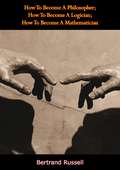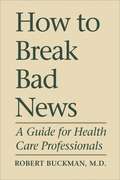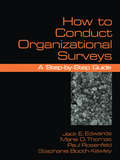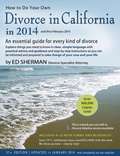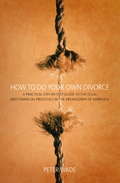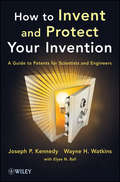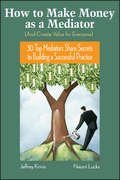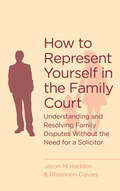- Table View
- List View
How Sick Is British Democracy?: A Clinical Analysis (Challenges to Democracy in the 21st Century)
by Richard RoseForecasts of the death of democracy are often heard and the United Kingdom is on the death watch list. This book challenges such a gloomy view by carefully examining the health of the British body politic from Tony Blair’s time in Downing Street to the challenges of Brexit and the coronavirus pandemic. It finds some parts are in good health, for example, elections are free and losers as well as winners accept the results, unlike the United States. Other parts show intermittent symptoms of ill health, such as Cabinet ministers avoiding accountability. There is also a chronic problem of managing the unity of the United Kingdom. None of the symptoms is fatal. The book identifies effective remedies for some symptoms, placebos that offer assurance without cure, and perennially popular prescriptions that are politically impossible. Being a healthy democracy does not promise effectiveness in dealing with economic problems, but a big majority of Britons do not want to trade the freedom that comes with democracy for the promises of undemocratic leaders.
How Smart are Cities without Adequate Finances?: A Comparative Analysis in South Asia (SpringerBriefs in Economics)
by Simanti Bandyopadhyay Firdousi Naher Aishna SharmaThis book compares urban finances in cities located in two different South Asian countries and assesses their fiscal health. It uses simulation to estimate the required augmentation in financial resources by the urban local bodies (ULBs) to reach a level of city development that is significantly better compared to existing levels. The book provides a systematic analysis of the fiscal health of two city corporations in Bangladesh, viz. Dhaka North City Corporation (DNCC) and Dhaka South City Corporation (DSCC); and one city corporation in the Indian state of West Bengal viz. Kolkata Municipal Corporation (KMC). The choice of city corporations was based on the shared history and the similarity of heritage, culture, topography and socio-economic conditions. Both DNCC and DSCC as well as the KMC have a high population density, which puts immense pressure on the service delivery provided by these corporations of basic services such as water supply, sanitation facilities, street lighting, drainage and sewerage and waste disposal. This is compounded by poor fiscal health of the ULBs. Using primary data collected through surveys and personal interviews and information obtained from official documents, the book estimates fiscal gaps of the ULBs and undertakes simple simulations to estimate potential revenue enhancements and expenditure requirements to deliver services at the internationally acceptable standards. It highlights under-exploited sources of revenue which can be better realized and also identifies untapped revenue sources that can be easily introduced, in order to significantly enhance city revenues. The book is an excellent resource not only for researchers studying this topic, but also for policy makers and urban planners, particularly those from developing countries having to deal with burgeoning cities with high migrant population density.
How They Broke Britain: The Instant Sunday Times Bestseller
by James O'Brien***THE RUNAWAY BESTSELLER, WITH NEW MATERIAL FOR THE PAPERBACK***THE REVEALING, DEFINING ACCOUNT OF THE DARK NETWORK THAT BROKE OUR COUNTRY.Something has gone really wrong in Britain.Our economy has tanked, our freedoms are shrinking, and social divisions are growing. Our politicians seem most interested in their own careers, and much of the media only make things worse. We are living in a country almost unrecognisable from the one that existed a decade ago. But whose fault is it really? Who broke Britain and how did they do it?Bold and incisive as ever, James O'Brien reveals the shady network of influence that has created a broken Britain of strikes, shortages and scandals. He maps the web connecting dark think tanks to Downing Street, the journalists involved in selling it to the public and the media bosses pushing their own agendas. Over ten chapters, each focusing on a particular person complicit in the downfall, James O'Brien reveals how a select few have conspired - sometimes by incompetence, sometimes by design - to bring Britain to its knees.
How They Got Away With It: White Collar Criminals and the Financial Meltdown
by David C. Brotherton Stephen Handelman Susan WillA team of scholars with backgrounds in criminology, sociology, economics, business, government regulation, and law examine the historical, social, and cultural causes of the 2008 economic crisis. Essays probe the workings of the toxic subprime loan industry, the role of external auditors, the consequences of Wall Street deregulation, the manipulations of alpha hedge fund managers, and the "Ponzi-like" culture of contemporary capitalism. They unravel modern finance's complex schematics and highlight their susceptibility to corruption, fraud, and outright racketeering. They examine the involvement of enablers, including accountants, lawyers, credit rating agencies, and regulatory workers, who failed to protect the public interest and enforce existing checks and balances. While the United States was "ground zero" of the meltdown, the financial crimes of other countries intensified the disaster. Internationally-focused essays consider bad practices in China and the European property markets and draw attention to the far-reaching consequences of transnational money laundering and tax evasion schemes. By approaching the 2008 crisis from the perspective of white collar criminology, contributors build a more general understanding of the collapse and crystallize the multiple human and institutional factors preventing capture of even the worst offenders.
How To Be a Stoic (Penguin Great Ideas)
by Epictetus Marcus Aurelius Seneca'Don't hope that events will turn out the way you want, welcome events in whichever way they happen'How can we cope when life's events seem beyond our control? These words of consolation and inspiration from the three great Stoic philosophers - Epictetus, Seneca and Marcus Aurelius - offer ancient wisdom on how to face life's adversities and live well in the world.One of twenty new books in the bestselling Penguin Great Ideas series. This new selection showcases a diverse list of thinkers who have helped shape our world today, from anarchists to stoics, feminists to prophets, satirists to Zen Buddhists.
How To Become A Philosopher; How To Become A Logician; How To Become A Mathematician
by Bertrand RussellA brief yet informative book by one of the founders of analytic philosophy in which he introduces the reader to various analytic movements throughout the 20th century—Philosophy, Logicism, and Mathematics—and their application. A prolific writer on many subjects, and a great popularizer of philosophy, author Bertrand Russell is eminently placed to discuss these topics.An invaluable addition to any philosophy library!
How To Break Bad News: A Guide for Health Care Professionals (The Royal Society of Canada Special Publications)
by Robert BuckmanFor many health care professionals and social service providers, the hardest part of the job is breaking bad news. The news may be about a condition that is life-threatening (such as cancer or AIDS), disabling (such as multiple sclerosis or rheumatoid arthritis), or embarrassing (such as genital herpes). To date medical education has done little to train practitioners in coping with such situations. With this guide Robert Buckman and Yvonne Kason provide help.Using plain, intelligible language they outline the basic principles of breaking bad new and present a technique, or protocol, that can be easily learned. It draws on listening and interviewing skills that consider such factors as how much the patient knows and/or wants to know; how to identify the patient's agenda and understanding, and how to respond to his or her feelings about the information. They also discuss reactions of family and friends and of other members of the health care team.Based on Buckman's award-winning training videos and Kason's courses on interviewing skills for medical students, this volume is an indispensable aid for doctors, nurses, psychotherapists, social workers, and all those in related fields.
How To Conduct Organizational Surveys: A Step-by-Step Guide
by Marie D. Thomas Paul Rosenfeld Stephanie Booth-Kewley Jack EdwardsOrganizations are increasingly turning to surveys to solve many business-related problems. This book provides those who want to plan organizational surveys with a step-by-step, `how-to' guide. The authors describe the issues that must be addressed at each step in the process, the advantages and disadvantages that result from many of the choices that must be made, and practical lessons learned from their years of experience in designing and conducting surveys.
How To Create A Vegan World: A Pragmatic Approach
by Tobias Leenaert<P>In this thought-provoking book, Tobias Leenaert leaves well-trodden animal advocacy paths and takes a fresh look at the strategies, objectives, and communication of the vegan and animal rights movement.<P> He argues that, given our present situation, with entire societies dependent on using animals, we need a very pragmatic approach.<P> How to Create a Vegan World contains many valuable ideas and insights for both budding advocates for animals and seasoned activists, organizational leaders, and even entrepreneurs.
How To Do Your Own Divorce In California In 2014
by Ed ShermanWith How to Do Your Own Divorce in California in 2014, Californians can obtain an uncontested divorce without hiring an attorney. Even if the couple wants to use an attorney, this book is still an essential guide to make things go smoother including new and revised court forms for readers. The first part of the book explains in detail how to divide property and settle custody, visitation, and child support issues. The second part is a step-by-step guide through the court process, including how to complete important forms, when to file them, and how to get through a court appearance or even avoid it altogether.
How To Do Your Own Divorce: A Practical Step-by-step Guide to the Legal and Financial Processes in the Breakdown of Marriage
by Peter Wadehis book will take you through every aspect of a divorce using clear explanations of the law, and providing checklists, together with examples of the court forms and draft letters. It explains the complete procedure.Contents: Introduction; 1. Am I entitled to a divorce?; 2. The Costs; 3. Your Property and Your Children; 4. The Law Society's Family Law Protocol; 5. Pre-Marital Agreements; 6. Children; 7. Maintenance for You and Your Spouse; 8. Civil Partnerships; 9. Happily Ever After?; 10. Statutory Background to Divorce; Frequently Asked Questions; Glossary; Useful Addresses, Websites and Forms; Appendix: Letters and Forms; Index.
How To Do Your Own Divorce: A Practical Step-by-step Guide to the Legal and Financial Processes in the Breakdown of Marriage
by Peter Wadehis book will take you through every aspect of a divorce using clear explanations of the law, and providing checklists, together with examples of the court forms and draft letters. It explains the complete procedure.Contents: Introduction; 1. Am I entitled to a divorce?; 2. The Costs; 3. Your Property and Your Children; 4. The Law Society's Family Law Protocol; 5. Pre-Marital Agreements; 6. Children; 7. Maintenance for You and Your Spouse; 8. Civil Partnerships; 9. Happily Ever After?; 10. Statutory Background to Divorce; Frequently Asked Questions; Glossary; Useful Addresses, Websites and Forms; Appendix: Letters and Forms; Index.
How To Go Vegan: The why, the how, and everything you need to make going vegan easy
by VeganuaryGoing vegan is easy!Whether you're already a full-time vegan, considering making the switch or know someone who is, this book will give you all the tools you need to make the change towards a healthier, happier and more ethical lifestyle. How to Go Vegan includes...Why try vegan?Animal welfare, the environment, health benefits and your personal adventure.Vegan at homeSurprisingly vegan foods, reading labels, vegan ingredient essentials, easy replacements, how to be the only vegan in the familyVegan out in the worldEating out, eating at friends' houses, answering questions from loved ones, travelling veganLiving the vegan lifestyleMeal plans, tips and tricks, what to do if you're struggling, how to celebrate being a veganHow to go vegan. It's easier than you think.
How To Go Vegan: The why, the how, and everything you need to make going vegan easy
by VeganuaryEver thought about eating less meat and fewer dairy products? Concerned about animal welfare and the environment? Interested in the health benefits of a plant-based lifestyle? This is the book for you. In this fun, easy to follow and informative guide, the team behind the charity Veganuary provide everything you need to make changes towards leading a healthier, more ethical and sustainable lifestyle. From your motivations, tips for eating out, easy substitutions and making sure you get the right nutrients, this book is a lifesaver for vegans, those wanting to give veganism a try, or for friends and family. Try going vegan for one month - with How To Be Vegan it is easier than you think.
How To Go Vegan: The why, the how, and everything you need to make going vegan easy
by Veganuary Trading LimitedA short guide to going vegan - the why, the what and the how.Ever thought about eating less meat and fewer dairy products? Concerned about animal welfare and the environment? Interested in the health benefits of a plant-based lifestyle? This is the book for you. In this fun, easy to follow and informative guide, the team behind the charity Veganuary provide everything you need to make changes towards leading a healthier, more ethical and sustainable lifestyle. From your motivations, tips for eating out, easy substitutions and making sure you get the right nutrients, this book is a lifesaver for vegans, those wanting to give veganism a try, or for friends and family. Try going vegan for one month - with How To Be Vegan it is easier than you think.(P)2017 Hodder & Stoughton
How To Invent And Protect Your Invention
by Joseph P. Kennedy Wayne H. WatkinsA straightforward guide to inventing, patenting, and technology commercialization for scientists and engineers Although chemists, physicists, biologists, polymer scientists, and engineers in industry are involved in potentially patentable work, they are often under-prepared for this all-important field. This book provides a clear, jargon-free, and comprehensive overview of the patenting process tailored specifically to the needs of scientists and engineers, including: Requirements for a patentable invention How to invent New laws created by President Obama's 2011 America Invents Act The process of applying for and obtaining a patent in the U. S. and in foreign countries Commercializing inventions and the importance of innovation Based on lecture notes refined over twenty-five years at The University of Akron, How to Invent and Protect Your Invention contains practical advice, colorful examples, and a wealth of personal experience from the authors.
How To Make Money as a Mediator (And Create Value for Everyone)
by Jeffrey Krivis Naomi LucksHow to Make Money as a Mediator (and Create Value for Everyone) is an invaluable and inspirational resource filled with practical, proven, and down-to-earth information on how you can develop a satisfying and lucrative career as a mediator, no matter what your area of interest--labor and employment mediation, intellectual property, environment, personal injury, family and divorce, contract, securities, or international peacekeeping.
How To Make Your Own Will 4th Edition: Make Life Simpler For Those You Leave Behind - Ensure That Your Estate Goes To The People Who You Want To Benefit - Minimise The Tax In Your Estate
by Gordon BowleyThis invaluable book really will enable you to prepare your own will. It will alert you to the many and broad ranging matters you should consider, and covers factual and legal requirements and technicalities in language that the lay-person can understand. Author, Gordon Bowley, draws on his thirty years as a family solicitor to suggest the best and most effective ways of ensuring that your estate is easy to deal with by those you leave behind and that it goes to those who you want to benefit. This revised and updated 4th edition includes changes in recent legislation and case law. It includes: - Advice on choosing executors - Specimen forms, sample wills and sample clauses - A glossary clearly explaining any necessary legal terms - Guidance on inheritance tax and tax saving in your will - Information on Living Wills and Powers of Attorney
How To Make Your Own Will 4th Edition: Make life simpler for those you leave behind. Ensure that your estate goes to the people who you want to benefit. Minimise the tax in your estate.
by Gordon BowleyThis invaluable book really will enable you to prepare your own will. It will alert you to the many and broad ranging matters you should consider, and covers factual and legal requirements and technicalities in language that the lay-person can understand. Author, Gordon Bowley, draws on his thirty years as a family solicitor to suggest the best and most effective ways of ensuring that your estate is easy to deal with by those you leave behind and that it goes to those who you want to benefit. This revised and updated 4th edition includes changes in recent legislation and case law. It includes: - Advice on choosing executors - Specimen forms, sample wills and sample clauses - A glossary clearly explaining any necessary legal terms - Guidance on inheritance tax and tax saving in your will - Information on Living Wills and Powers of Attorney
How To Manage Your Mammoth: The Procrastinator's Guide to Getting Things Done
by Wendy JagoHow to Manage Your Mammoth draws on a single coaching technique, bite sizing, to help you manage issues and tasks that you find difficult, overwhelming or impossible. You can use bite sizing to break down a difficult task or build up to a goal. Experienced psychotherapist and coach Wendy Jago draws on her work with business professionals worldwide in the banking and commercial sectors, to provide a user-friendly guide packed with short, snappy exercises to help even the worst procrastinators. How to Manage Your Mammoth will cover: * How you naturally approach problems. Do you hone in on the details/specifics straight away or do you think of a problem in its entirety rather than its parts? * How much energy and stamina do you have to draw on. What is your natural attention span? The book will show you how to work with your natural energy and attention levels and not against them.* How we unintentionally create mammoths and how we can avoid doing so. * What to do when other people in your life have a different way of managing tasks that conflicts with your style. How do you work together to get the job done?*How much can be achieved in very small chunks of time, known as twenty-minute miracles.
How To Manage Your Mammoth: The procrastinator's guide to getting things done
by Wendy JagoHow to Manage Your Mammoth draws on a single coaching technique, bite sizing, to help you manage issues and tasks that you find difficult, overwhelming or impossible. You can use bite sizing to break down a difficult task or build up to a goal. Experienced psychotherapist and coach Wendy Jago draws on her work with business professionals worldwide in the banking and commercial sectors, to provide a user-friendly guide packed with short, snappy exercises to help even the worst procrastinators. How to Manage Your Mammoth will cover: * How you naturally approach problems. Do you hone in on the details/specifics straight away or do you think of a problem in its entirety rather than its parts? * How much energy and stamina do you have to draw on. What is your natural attention span? The book will show you how to work with your natural energy and attention levels and not against them.* How we unintentionally create mammoths and how we can avoid doing so. * What to do when other people in your life have a different way of managing tasks that conflicts with your style. How do you work together to get the job done?*How much can be achieved in very small chunks of time, known as twenty-minute miracles.
How To Pick a Puppy: An Ethical Guide To Choosing the Perfect Pet
by Vanessa HolburnFrom animal welfare campaigner Vanessa Holburn and with a foreword by dog lover and presenter of 'A Place in the Sun' Danni Menzies, this book has everything you need to know to help you pick the perfect pooch for your home and lifestyle.How To Pick a Puppy is the essential handbook to finding a 'furever' dog and ensuring that you have many happy and healthy years together. It contains practical advice on how to research the types and breeds of dog available. It considers the pros and cons of puppies, senior, pedigree and rescue dogs, and explains why one might suit an individual more than another. The book equips the reader with all the right questions they need to ask before they choose a dog and shows them how to find a responsible breeder or rescue centre. It teaches how to avoid the pitfalls of getting the wrong dog from the wrong place, and shows you how to spot and avoid a puppy farmer. It also explains the legal responsibilities of dog ownership and covers the range of hobbies and activities owners and dogs can enjoy together. At each stage of the book, Vanessa's advice is complemented by comment from canine experts such as trainers, behaviourists, breeders and those involved in rescue. Happy dog owners and foster carers also add their experience. In the final section the book guides you through the settling in period, discussing early training, socialisation and vet care, so your first month together can be as smooth as possible.
How To Pick a Puppy: An Ethical Guide To Choosing the Perfect Pet
by Vanessa HolburnFrom animal welfare campaigner Vanessa Holburn and with a foreword by dog lover and presenter of 'A Place in the Sun' Danni Menzies, this book has everything you need to know to help you pick the perfect pooch for your home and lifestyle.How To Pick a Puppy is the essential handbook to finding a 'furever' dog and ensuring that you have many happy and healthy years together. It contains practical advice on how to research the types and breeds of dog available. It considers the pros and cons of puppies, senior, pedigree and rescue dogs, and explains why one might suit an individual more than another. The book equips the reader with all the right questions they need to ask before they choose a dog and shows them how to find a responsible breeder or rescue centre. It teaches how to avoid the pitfalls of getting the wrong dog from the wrong place, and shows you how to spot and avoid a puppy farmer. It also explains the legal responsibilities of dog ownership and covers the range of hobbies and activities owners and dogs can enjoy together. At each stage of the book, Vanessa's advice is complemented by comment from canine experts such as trainers, behaviourists, breeders and those involved in rescue. Happy dog owners and foster carers also add their experience. In the final section the book guides you through the settling in period, discussing early training, socialisation and vet care, so your first month together can be as smooth as possible.
How To Represent Yourself in the Family Court: A guide to understanding and resolving family disputes
by J. Hadden R. DaviesThis book covers areas such as contact between parents and children, where a child should live and with whom, where a child should go to school, domestic violence and many other issues where agreement may not be possible. It sets out the law in a way you will be able to understand and apply. and contains a wealth of practical tips to ensure that you present yourself and your case well throughout proceedings. It will guide you in drafting statements, addressing the court, answering questions during cross-examination and dealing with professionals at court.
How To Secure Your H-1b Visa
by James A. Bach Robert G. WernerMulti-finger Haptic Interaction presents a panorama of technologies and methods for multi-finger haptic interaction, together with an analysis of the benefits and implications of adding multiple-fingers to haptic applications. Research topics covered include: design and control of advanced haptic devices;multi-contact point simulation algorithms;interaction techniques and implications in human perception when interacting with multiple fingers. These multi-disciplinary results are integrated into applications such as medical simulators for training manual skills, simulators for virtual prototyping and precise manipulations in remote environments. Multi-finger Haptic Interaction presents the current and potential applications that can be developed with these systems, and details the systemsOCO complexity. The research is focused on enhancing haptic interaction by providing multiple contact points to the user. This state-of-the-art volume is oriented towards researchers who are involved in haptic device design, rendering methods and perception studies, as well as readers from different disciplines who are interested in applying multi-finger haptic technologies and methods to their field of interest. "





